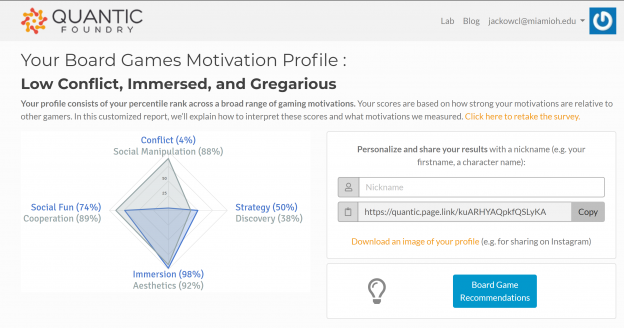When I took the assessment, I learned that my motivation profile is low conflict, immersed, and gregarious. I had 4% conflict, 88% social manipulation, 50% strategy, 38% discovery, 22% need to win, 98% immersion, 92% aesthetics, 74% social fun, 89% cooperation, 12% chance, and 50% accessibility. Some of these I am surprised by and others, not so much.
For conflict, I knew that it would be low. As much as I am competitive and want to win, I tend to steer away from these types of games just because I don’t want to talk up a big game and lose. I don’t want to be a sore loser and try to cheer up the rest of the game night. I’ve been going for less conflicting games so I can just brush off a loss and move on. It makes it much more enjoyable just to have a good time and not feel stressed about having to win all the time. For social manipulation, the secondary motivation, I was quite surprised. I am a pretty bad liar, so I have difficulty understanding what makes me drawn to this type of motivation. I think in this case, it’s less about my ability to lie and more about detecting other people’s lies. I do enjoy playing the game Coup and it’s just fun to look at other’s faces and try to tell if their lying. I barely lie in that game and when I do, its me pretending to be ambassador just so I can shuffle through the deck and not have to lie about a role by finding it.
For strategy, I was not surprised about either. I do enjoy strategy games but sometimes I don’t want to be strategizing. It’s just my personal preference at that time and it changes constantly. I do love making smart plays but sometimes I don’t even want to think about something in advance. For one of the secondary motivations, discovery, I’m surprised how low it is. I love playing new games and discovering new game mechanics. There are several different types of games that I have. Why this is so low I can’t understand. Maybe I like the same game too much. For the other motivation, need to win, I am not surprised just like the conflict. This one I know is higher because it is more based on how I play independently and I’m not attacking other people specifically. I do like to win but I don’t want to think about it as much.
For both immersion and aesthetics, they are extremely high, and I agree with these results. I love games with good character, and environment design. I love when the style and aesthetic matches with the game’s theme. A couple examples of this is Root, and The Tea Dragon Society. They are just so cute, and I love their style so much. So even if I’m losing, I get to gush over the cute pictures. I also love backstories and lore and fantasy elements. Games should be an escapism, so I want to go to another world. If I don’t, then what’s the point?
Finally, for social fun, I agree with how high it is. When I pull out a game, it should be because I want to have fun with my friends and come up with new inside jokes and discover more about each other. When my friends and I play Bohnanza, it is always hysterical, and it just makes me laugh and have a good time. It’s pure fun with my friends. For cooperation, I also understand why its so high. I love teams and working with people to win. Its nice to be able to trust someone and not be alone. If we lose, we lose together and that’s not so bad anymore. For chance, I know it is so low just because I don’t like it. Chance just feels like you’re constantly losing a fight and you can’t do anything about it. Even when you win, it’s empty because it was all because of luck. For accessibility, its higher than discovery but I still feel like both should be higher knowing how many different games I love. Traditional games are a little boring now that my friends have introduced me to so many others.


